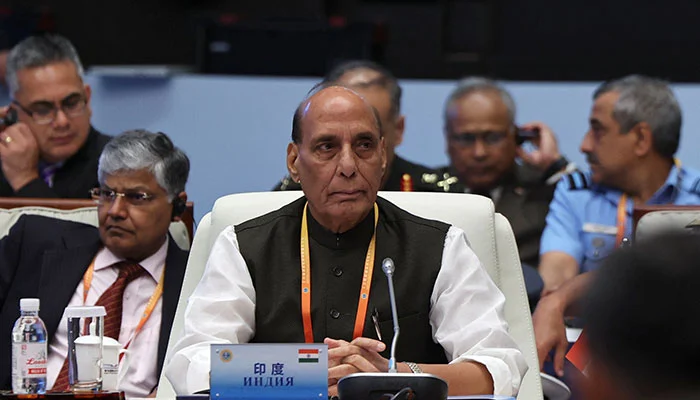In a significant diplomatic standoff, India refused to endorse the Shanghai Cooperation Organisation (SCO) joint statement during the defence ministers’ summit in Qingdao, China. The move followed the omission of the Pahalgam incident—where tourists were killed in Indian Illegally Occupied Jammu and Kashmir (IIOJK)—and the inclusion of alleged terrorist activities in Pakistan’s Balochistan region, which India termed as politically biased.
This rare rejection disrupted the SCO’s longstanding practice of issuing consensus-based declarations. India’s Defence Minister Rajnath Singh strongly criticized the imbalance in the proposed communiqué and called for a principled, unified approach to counterterrorism. Addressing the summit, Singh highlighted the growing trust deficit in the region and stressed the need for reformed multilateralism, peaceful dialogue, and mutual security cooperation.
“Peace, security, and trust remain our region’s most pressing challenges,” Singh asserted, reaffirming India’s stand against terrorism in all its forms.
Pakistan Emphasizes Neutrality in Counterterrorism Agenda
In contrast, Pakistan’s Defence Minister Khawaja Asif urged SCO members not to politicize counterterrorism efforts. Reaffirming Islamabad’s commitment to the SCO’s principles, Asif emphasized that regional stability, particularly in Afghanistan, is vital for South Asia’s long-term development and security.
He also brought attention to the unresolved Kashmir issue, citing it as a core factor impacting both regional and global peace. Pakistan called for collective security initiatives grounded in neutrality, free from selective narratives or geopolitical motivations.
Additionally, Pakistan’s National Security Advisor Lt Gen Asim Malik, representing Islamabad at the SCO Security Council Secretaries’ meeting in Beijing earlier, reiterated Pakistan’s dedication to peaceful multilateral collaboration and regional integration.
This latest fallout at the SCO summit underscores escalating tensions between India and Pakistan, spotlighting long-standing divisions on terrorism definitions, sovereignty claims, and security strategies. With consensus breaking down on key regional issues, the SCO faces a growing challenge in maintaining unity and cooperation among its member states.



Comments (0)
No comments yet. Be the first to comment!
Leave a Comment